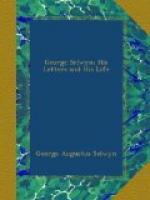(52) David Garrick (1717-79). In 1749 he married Eva Marie Violette, of Vienna, a dancer who had been received in the best houses in England. “I think I never saw such perfect affection and harmony as existed between them” (Dr. Beattie). Selwyn criticised disparagingly his Othello.
(53) John, second Earl of Upper Ossory (1745-1818). He was the brother of Richard Fitzpatrick and of Mary Fitzpatrick, wife of the second Lord Holland. He was educated at Eton and Oxford. “The man I have liked the best in Paris is an Englishman, Lord Ossory, who is the most sensible young man I ever saw” ("Walpole’s Letters,” vol. iv. p. 426). He married Annie, daughter of Lord Ravensworth, shortly after her divorce from the Duke of Grafton.
(54) William Petty, second Earl of Shelburne (1737-1805); created Marquis of Lansdowne, 1784; he became Secretary of State in Chatham’s second Administration, 1766, and resigned office on October 20, 1768, almost simultaneously with Lord Chatham on the fall of Lord North. In 1782 he again became Secretary of State in Lord Rockingham’s Ministry, and First Lord of the Treasury on the death of Rockingham. His Government came to an end on the coalition of Fox and North in 1783. He was the most liberal statesman of his time, “one of the earliest, ablest, and most earnest of English freetraders,” but he was at the same time one of the most unpopular, a supposed insincerity being the cause of it.
(55) Lady Bute was the daughter of Lady Mary Wortley Montagu.
(56) A society of exquisites drawn from the younger men at Brooks’s, noted for their affectation in dress and manner; travel abroad was necessary for admission to their society.
(57) Sir Joshua Reynolds(1723-1782). Selwyn was his patron and friend. When it was reported that Reynolds would stand as a candidate for the Borough of Plympton, and all the town was laughing at him, Selwyn remarked that he might very well succeed, “for Sir Joshua is the ablest man I know on a canvass.”
(58) Henry Edward Fox, youngest son of Lord Holland.
(59) Thomas Pelham-Holles, Duke of Newcastle (1693-1768). For half a century in the front of English political life. In 1724 he became Secretary of State in Walpole’s Administration, and continued in office until 1756, having on the death of his brother, Henry Pelham, in 1754, become First Lord of the Treasury. In 1757 he returned as Prime Minister to office with the elder Pitt, resigning again in 1762. In Lord Rockingham’s Ministry, 1765 to 1766, he was Lord Privy Seal. Newcastle is a remarkable instance of a man of apparently ordinary capacity holding high office in the State for many years.
Jan. 17, Sunday morning.—We received your Badge at last yesterday. Sir W. Musgrave and I deliberated a great while about the method of sending it, and at last went together to Lord Clive, who sets out for Paris to-morrow, and will take charge of it, as the surest conveyance. The courier was rejected as too expensive, and Mr. Ward as too uncertain. I have enclosed a schedule of what the packet delivered to Lord Clive contains. It is addressed to Sir J. Lambert and Mr. Ward. If he goes to Paris to-day, as he intended, [he] will carry a letter from me to Sir J. L[ambert] with directions for the safest and speediest conveyance of this to you; I shall write to him again upon the subject on Tuesday.




